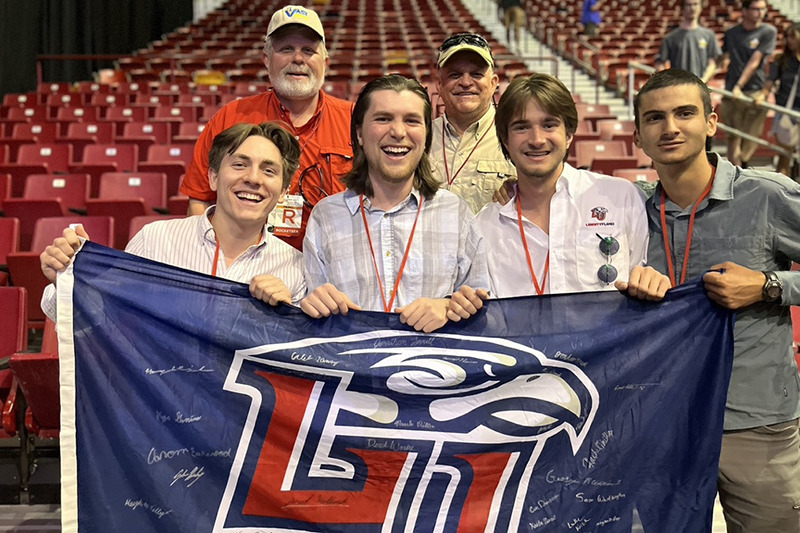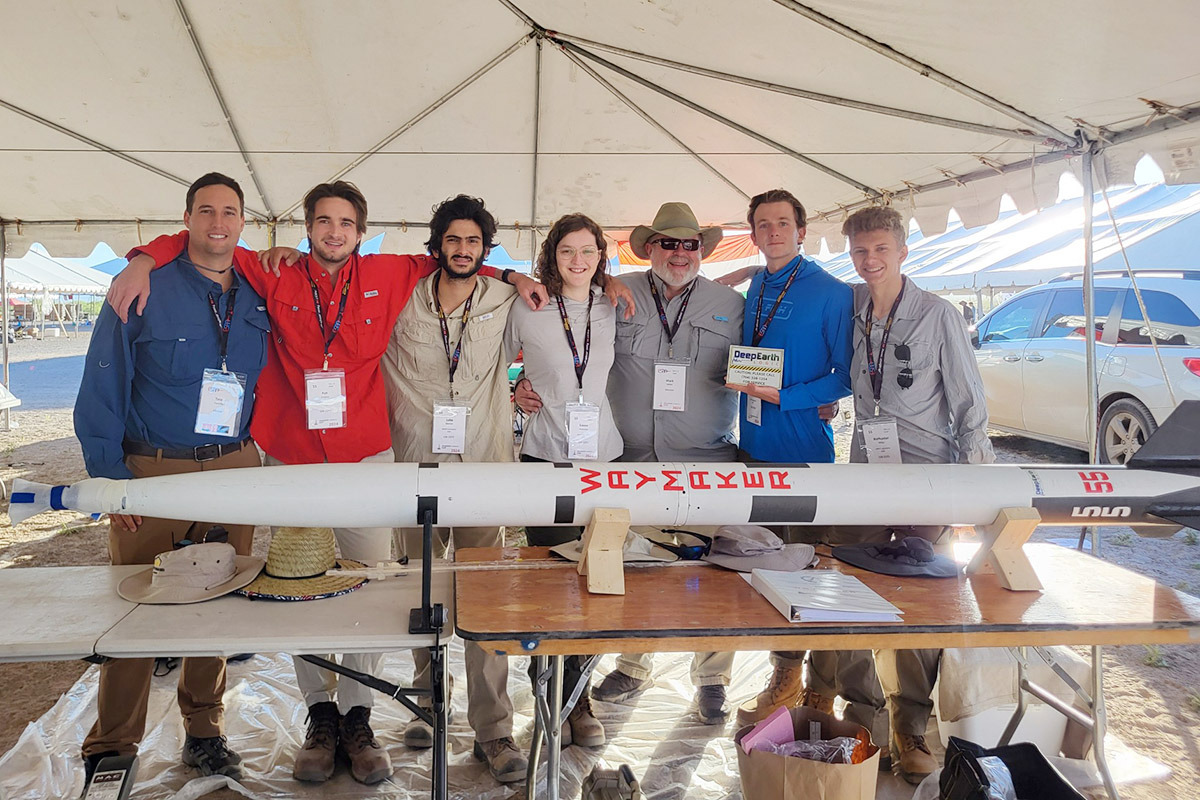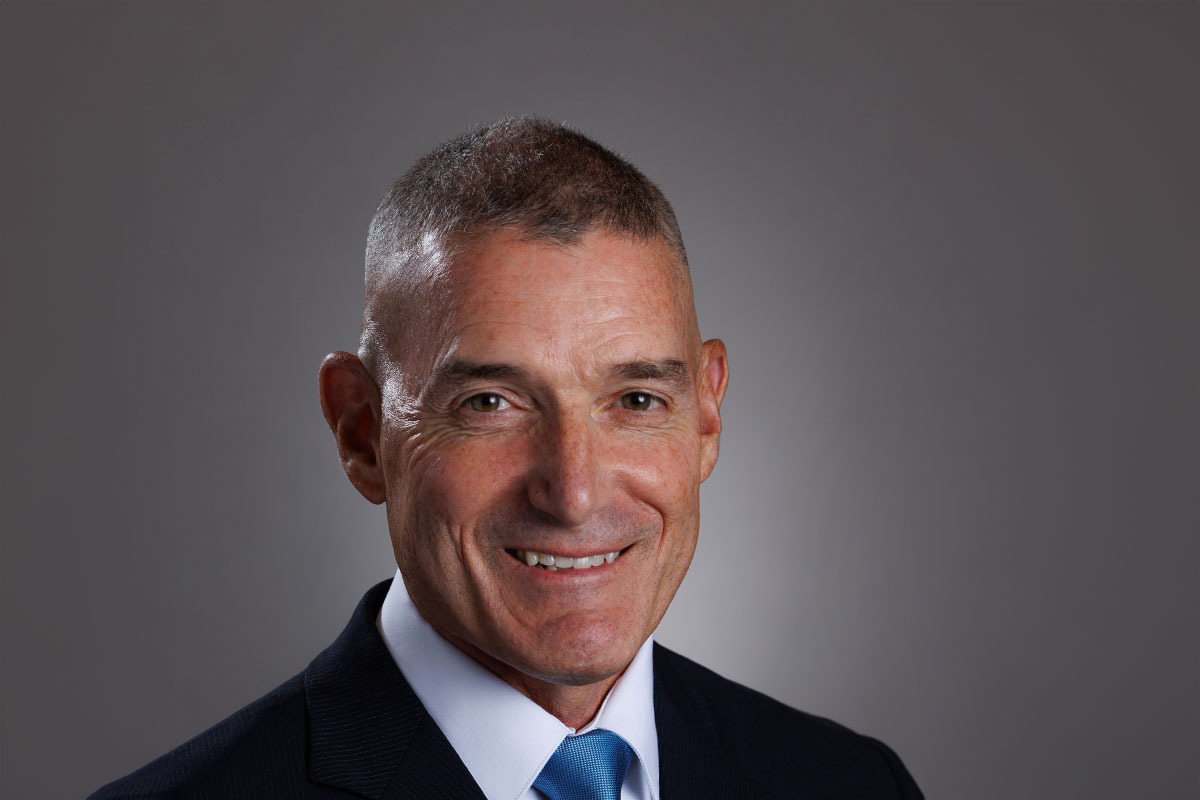Search News Archives
Filter News Articles
Additional Navigation
The sky’s the limit for Liberty University Rocketry team at premier international competition in New Mexico
July 13, 2023 : By Logan Smith - Office of Communications & Public Engagement
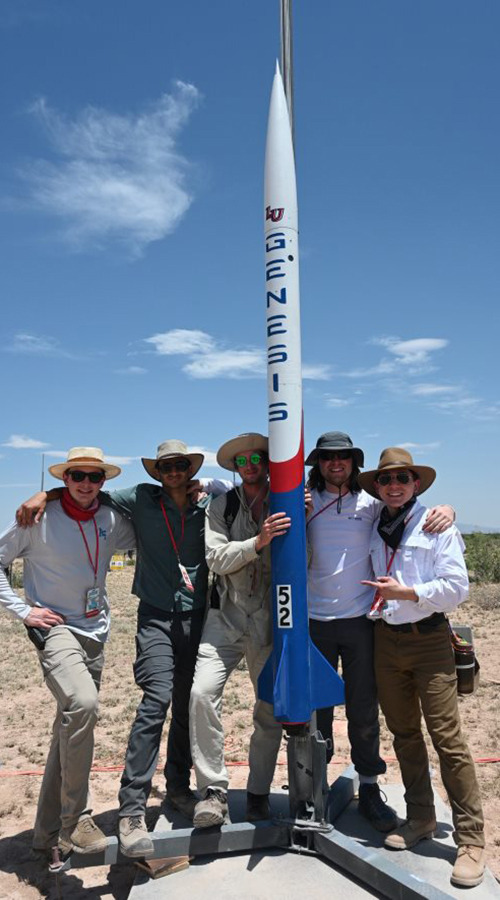
What do you get when you combine the creative minds of rocket scientists with a fervent desire to compete with excellence to bring glory to God? A high-flying project of astronomical proportions.
The Liberty University Rocketry team, one of a dozen competition teams sponsored by the School of Engineering, surpassed expectations at its first showing in the Spaceport America Cup, the world’s most prestigious collegiate rocketry competition, held June 19-24 in southern New Mexico. Liberty’s debut rocket, Genesis, blasted 9,440 feet and finished 39th out of 158 teams from around the world, besting schools with established aerospace engineering programs such as Mississippi State (40th), Michigan State (62nd), and Virginia Tech (78th). Amongst the field, 75 international teams represented schools from Norway, Italy, Germany, New Zealand, Australia, South Korea, Egypt, and more.
“For us to finish 39th overall was honestly shocking, because I didn’t know what to expect,” said Daniel Hembree, a senior mechanical engineering student who served as the team’s lead project manager. “For us to get in the top 25 percent of the competition as a first-year team with 25 members (most teams had up to 50), a limited budget, and no prior experience, was awesome. The Lord provided for us to make it this far.”
Hembree attributed the team’s strong finish to the support from the School of Engineering and the desire to amplify Christ in the world of aerospace engineering. During the competition, streamed online with thousands of views, the announcers introduced Liberty’s team as “the humble beginnings to a legacy of passionate, innovative, Christian engineers pushing the bounds of spaceflight for God’s glory.”
“Obviously, I want to perform well, win, and be the best, but not for any other reason other than to show what God has done,” Hembree said. “That has been the foundation of this team. This is the Lord’s team. If God’s not in it, I want nothing to do with it. I’m not doing this for the resumé. I’m not doing this to compete for a trophy. I’m not doing this for pride. I’m doing this because the Lord led me to. … There is a higher purpose in this.”
From manufacturing the 10-foot rocket, completely redesigning the parachute deployment system after testing challenges, and navigating the crises of two canceled test launches due to weather, challenges bombarded the team at every step leading up to competition.
Students constructed Genesis using a variety of lightweight, strong materials, including two types of fiberglass, carbon fiber, and aluminum. The custom-built avionics bay was 3D-printed from a chopped carbon fiber nylon and fitted with two altimeters and a GPS tracker. Students designed and built virtually every component of Genesis except for the motor.
Besides Hembree, the team was represented in New Mexico by Joshua Mack, the lead manufacturing engineer; Luke Steiner, lead payload engineer; Jarred Holland, lead aerodynamics engineer; and Kye Gonino, the lead recovery engineer.
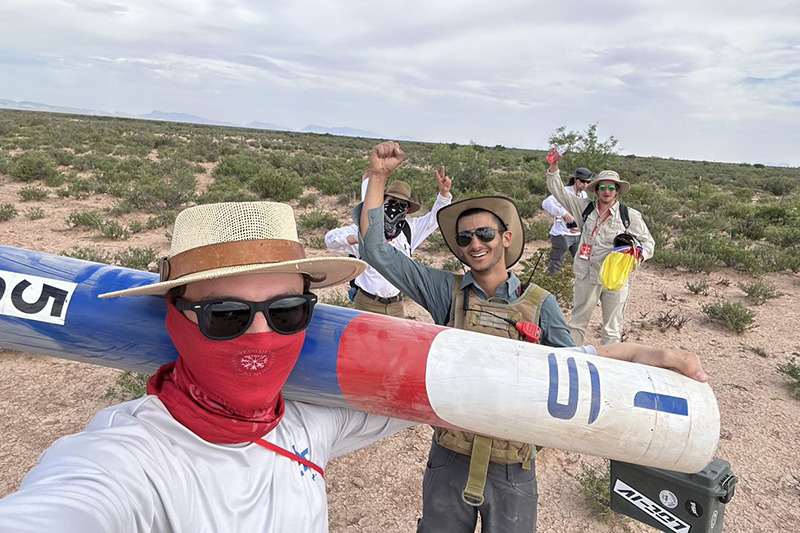
“They worked really well together as a team,” said Dr. Tate Fonville, a mechanical engineering professor and the program director for all 12 of the School of Engineering’s competition teams. “Rockets look simple, but a rocket is a high-precision system with a series of components that have to come together at the right time. The team had to design and build all their subsystems — electrical, computer science, aerospace, and mechanical — on the right timeline, working simultaneously so the completed system was ready to test.”
With two test launches scheduled in Virginia canceled by storm systems, the competition was the first time the team launched Genesis with a new parachute deployment design. The result was an astounding success, and it cemented a bright future for Liberty’s rocketry team.
“They did an excellent job,” Fonville said. “It was one of our best success stories so far. For a first-year team and one of the only schools there without an aerospace program, they did so well and are looking forward to next year.”
Judges graded teams on a wide range of categories, from the technical report, target altitude, parachute deployment, and post-flight recovery inspection. The flight, including the launch, altitude parachute deployment, and post-flight inspection, was worth 50 percent; the design and pre-launch poster presentation accounted for 30 percent; and the technical report the remaining 20 percent. Liberty tallied a final score of 850 out of 1,000 possible points. A complete breakdown of scores is available online.
After passing a safety test and a launch-preparedness inspection, Genesis was one of the first 10 rockets cleared to launch on Day 1, which gave the team a 100-point “prompt launch” bonus to start the competition. During the preparation, Liberty’s entry was also one of 24 finalists to be selected to give an in-depth 20-minute presentation of its unique parachute-deployment redesign to an audience of aerospace enthusiasts, judges, and other students from around the globe.
Fonville credited the team’s technical advisor, Mark Miller, a Lynchburg resident who advised the team based on his more than 30 years of experience with collegiate-level rocketry, for its quick ascent on an international scale.
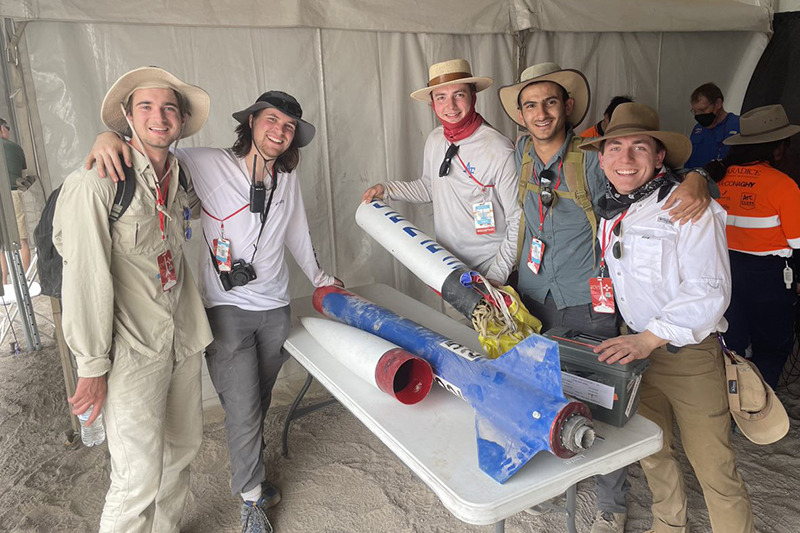
Senior mechanical engineering student Cole Derosett, the team’s lead design engineer who was not able to make the trip, said the project has been a labor of love for three years.
“I feel so grateful to lead and work alongside such a group of talented students the past three years to build something truly special,” he said. “God is good, and our score is a testament that if you put something in God’s hands, you’ll see God’s hands in it. I am just so incredibly proud of our team and the way they persevered through trials and tough obstacles of many kinds, with joy and excellence, to build one of the world’s best sounding rockets. It also makes me excited, if we can do this for Genesis (the first rocket they have built), imagine what this program will be like five years from now.”
Derosett, Hembree, and other team members expressed appreciation to the School of Engineering for its efforts to secure funding and accommodate the team with laboratory space in the Hudgins Building, which houses Liberty’s civil engineering department and the competition teams. They also gave much gratitude to Dr. Fonville, the team’s faculty advisor; School of Engineering Dean Dr. Mark Horstemeyer; Director of Admin Operations Valda Rowe, who performed many of the administrative duties behind the scenes; and many other dedicated Liberty staff members and faculty who believed in the team.
“God is doing big things at LU and with this team,” Derosett said. “I have no doubt that in the near future, we’ll be one of the best engineering schools in the nation. We’re going to keep innovating and doing bigger and better things to magnify Christ and prepare our students to make a difference in the world through space exploration.”
